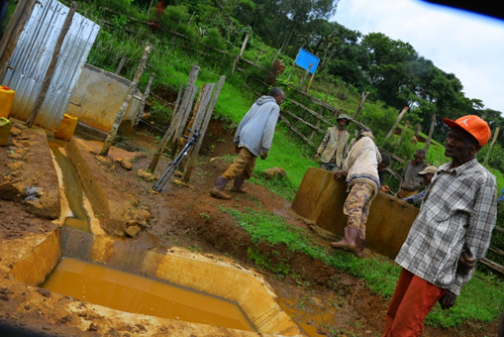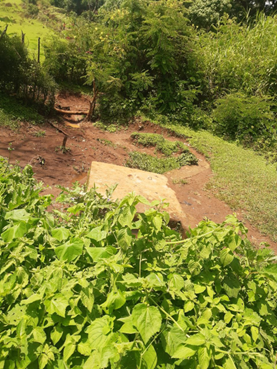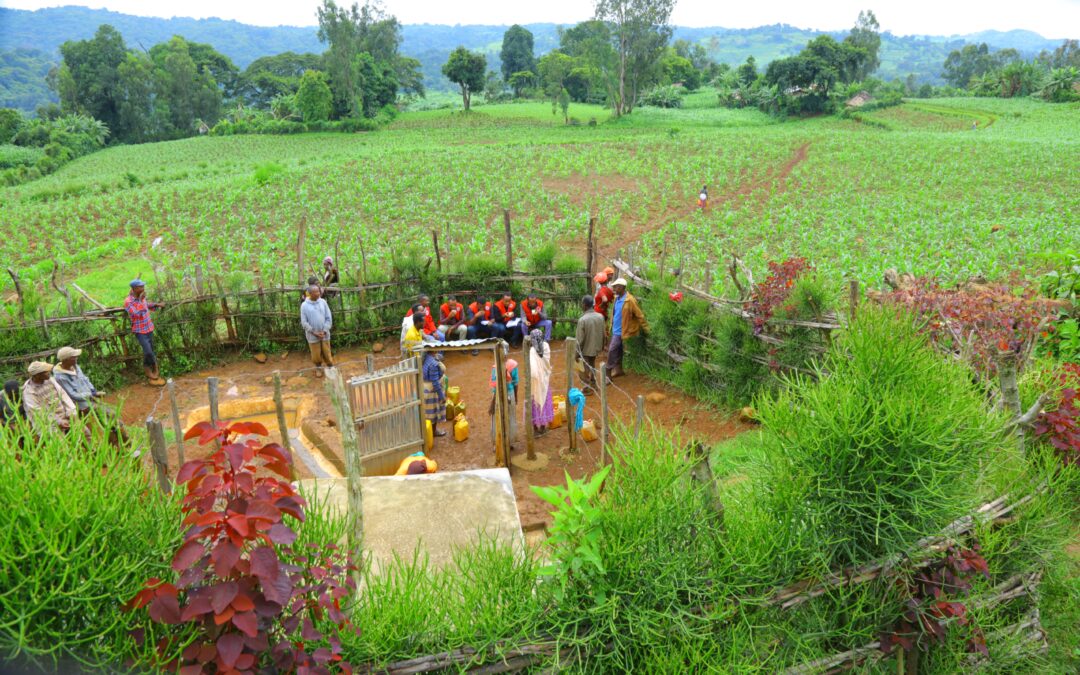Ethiopian Red Cross Association (ERCS) Illu Aba Bor branch is one of the 7 ERCS branches who implemented Skybird micro projects in Ethiopia in Skybird cycle 2 program implementation period from November 1st 2021 till October 31st 2022.
ERCS Illu Aba Bor Branch Skybird micro project is entitled “Improving WASH and Livelihood Conditions of Gadisa Oda and Sedo Kebeles in Mettu District of Illu Abab Bora Zone” and one of its components is: Improving water access by construction of two hand dug wells and one spring.
A team from AutRC and ERCS conducted a learning documentation visit on July 07, 2023 to ERCS Illu Aba Bor Branch and the micro project site, and talked to the beneficiaries. The learnings and challenges from implementing the micro project are presented below.
Illu Aba Bor Zone of the Oromia region of Ethiopia is sub-divided into 23 districts (woredas). Metu Zuria is one of the administrative districts of Illu Aba Bor Zone located near Mettu town, which is the capital of Ilu Aba Bora Zone located about 550 kilometers to the south-west of Ethiopia’s capital, Addis Ababa. Woredas in Illu Aba Bora Zone are subdivided into Kebeles and the Kebeles are further subdivide into “Gots”. “Gots” are further subdivided into “Garee” (villages) by the government for developmental activity purposes including WASH and Health. The “Garee”(village) is the smallest administrative unit consists of 30 -40 households.

The water construction work is implemented in three villages of Seddo kebele. Table 1 shows the villages reached, the total number of households and individuals who directly benefited from the drinking water supply construction works and details of the water committees in each water points.

1. Spring water for Doreni village in Bochende, Sedo Kebele
Clean water was one of the tough challenges of Doreni villagers. There was no access to safe drinking water in this village where 44 households live, not a single hand dug well. The households were fetching water from an unprotected spring found in the village.
Mulu Terefe, 35, married and with four children, lives in Doreni village of Bochende in Seddo Kebele. Mulu and rest of the community were suffering from lack of access to clean water for a long period of time. She says, “We used to fetch water from a spring for decades which is not protected by a structure (spring box) and we, especially children, were exposed to various water borne diseases. When we take our children to the clinic, they tell us to boil the water before drinking to make it safe. But we don’t have electricity. The charcoal that we are buying we are using it for cooking food. It also takes long time to boil water and to wait till it cools and often we end up drinking the water without boiling. We used to spend money and our productive time taking care of our children who were getting sick and traveling more than one and half hours to a Health Center in Tulube, our neighboring woreda.”
Wondimu Teka, 50, father of 5 children, who was born and lived his entire life in Doreni village, says “We had a lot of cases of typhoid and diarrhea among our children. there is no road access for ambulance. We had to carry them and walk to the health center.”


Now a concrete protection box (spring catchment/spring box) is constructed around the actual source of the spring water (the “spring eye”) to prevent all potential sources of contamination. A collection box (the spring chamber) is also constructed to ensure adequate water storage. A delivery pipe is connected from the catchment to the chamber and water move by gravity flow. A drainage channel is constructed to guide spilled water away from the spring and it is connected to a watering facility constructed for livestock outside the spring storage tank and tap stand area. Cloth washing basin slab is also constructed near the facility.



2. Hand dug well for Ambise village in Jifargobo, Sedo Kebele
Alemitu Tesfaye, mother of 2 children, who lived in Ambise village for more than 30 years, said “We have been using a spring water source. it has served us for more than 20 years. But as it gets older, it started to leak. When it rains, flood enters the spring storage tank. There was also sediment filling the spring box. After removing it, cleaning and disinfecting the spring box, sediment fills up again when it rains and flooded. We couldn’t use it any longer.”
Under the Skybird micro project, one hand dug well fitted with Afridev hand pump is now constructed in Ambise “Garee” (village), Jifargobo “Got”, in Seddo kebele. Out of the 5 “Garees” (villages) in Jifargobo “Got”, around 120 households from 3 villages are now using this hand dug well.


3. Hand dug well for Balatu village in Haro, Sedo kebele
One hand dug well with Afridev hand pump is constructed in Balatu village of Haro in Seddo kebele benefiting 46 households. The households were previously using a protected spring water which is located in neighboring kebele, Kochi, in a place known as 01 Anbesa Gere, which takes them 20 minutes to get there (about an hour to collect and bring water).
Adisu Befikadu, who lives in Belatu village, said “The spring water that we were using was clean and free to use. But there were maintenance issues. There were cracks here and there causing leakages. We have contributed money, to buy sand and cement, and labor to repair it using cement mortar. It is also far from our place. Now, thanks to Ethiopian and Austrian Red Cross, we have hand dug well in our village which we can access with.”

